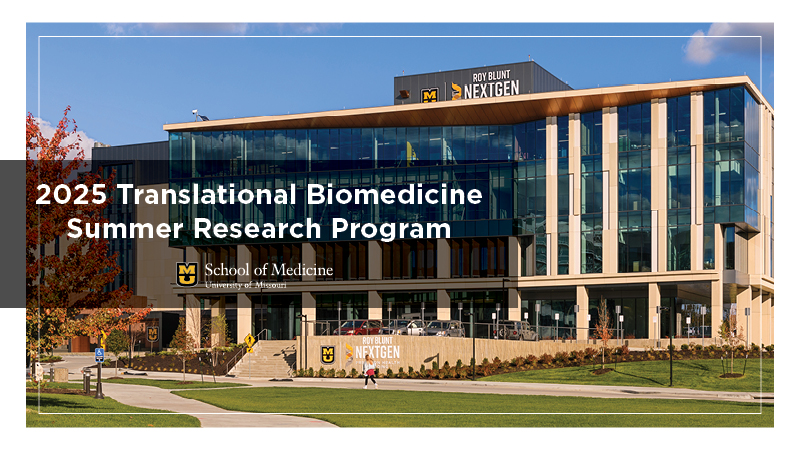
As part of the University of Missouri’s NextGen Precision Health Initiative, the School of Medicine has developed a new Summer Research Program in Translational Biomedicine. This training program seeks to recruit highly motivated and creative young scientists who are interested in developing innovative solutions to difficult problems in biology and medicine. The purpose of this 9-week, full-time summer research program is to provide undergraduates with an intensive interdisciplinary research experience that emphasizes preparation for graduate programs, including our Translational Biosciences PhD.
Students will conduct research full-time, and we work with students to find mentors that align with their research interests. Research interest areas include Biochemistry and Biophysics, Cancer Biology, Infection and Immunity, Integrative Physiology, Nutrition and Exercise Physiology, and Population and Precision Health. All students will also attend a weekly Translational Biomedicine seminar, and have the option of attending an additional weekly professional development seminar. TBM interns will participate in the larger summer program at Mizzou, including evening seminars, social events, and orientation. At the end of the summer students will present their research at a poster forum.
The TBM summer research program is interested in recruiting students from all backgrounds and undergraduate institutions. Undergraduates who are participants in their home institution’s NIH-funded MARC or RISE programs. MARC/RISE students should indicate on their application if they are a participant in one of these programs and include a letter of recommendation from their Program Director and contact information. For all students,stipends, transportation, housing/meals will be adjusted to fall within the NIH guidelines, in coordination with the student’s home institution. The University of Missouri is home to a number of NIH training programs (ie, MARC, IMSD, PREP, T-32) and we are actively looking to provide undergraduates from other institutions with a summer experience at a research intense institution with wrap-around programming and support. Students should expect to work 40 hours per week in their lab, attend mandatory weekly meetings, and join in various professional development activities.
Applicants should be enrolled in undergraduate degree program in a STEM discipline have completed at least two years of college, and have prior research experience. Preference will be given for students who are interested in pursuing their PhD at the University of Missouri. Students must be US citizens or permanent residents and must be continuing their undergraduate degree in Fall 2025.
Applicants should review the department and faculty research descriptions, listed separately below.
The deadline to apply is February 16, 2025. Students must complete the application form and provide an unofficial transcript (including Fall 2024 grades); letters of recommendation (two preferred); a resumé; and a personal statement indicating career plans, prior research experience, and research interests. If completed online, documents will be submitted with the online application.
2025 Translational Biomedicine Undergraduate Research Program PDF
Applicants are encouraged to view the faculty research descriptions and list up to 8 potential mentors of interest. The program director will make final summer research placements depending on faculty availability to mentor in 2025.
Participating Departments and Faculty can be found on the following links:
Biochemistry and Biophysics (click here for faculty list)
The emphasis area of biochemistry and biophysics in the Translational Biomedicine Summer Undergraduate Research Program emphasizes student training in collaborative and cross-disciplinary research, critical thinking and professional development. It is closely interwoven with the scholarly and outreach activities of the faculty. The department has been a leader in interdisciplinary cooperation and collaboration across departments and the University of Missouri Schools and Colleges (Medicine, Veterinary Medicine, Agriculture and Food Sciences, Arts and Sciences, Engineering), U.S., and the world. Research topics include the molecular basis of cancer and human diseases, cell signaling, host-pathogen interactions, plant biology, structural biology, metabolic engineering, proteomics, metabolomics and structure- based drug discovery and design. Undergraduate research student training is strongly influenced by these interdisciplinary involvements. Biochemistry research students benefit from a vibrant and supportive biochemistry faculty members engaged in mentoring and providing a nurturing training environment.
Cancer Biology (click here for faculty list)
The emphasis area of cancer biology in the Translational Biomedicine Summer Undergraduate Research Program provides a comprehensive introduction to the field of cancer biology. Cancer biology is a multidisciplinary field encompassing, but not limited to biology, biochemistry, immunology, genetics, virology, physiology, pharmacology, engineering, statistics and informatics. Faculty are found in many different departments and students will not be limited to a single department or rigid curriculum. The basis of training will cover the genetic and biological basis of cancer and current therapies, in addition to the challenges of discovery, development, and translational application of new therapies.
Infection and Immunity (click here for faculty list)
The emphasis area of infection and immunity in the Translational Biomedicine Summer Undergraduate Research Program is built around multidisciplinary activities with the mission to perform cutting-edge research that addresses relevant biomedical problems in bacterial and viral physiology, microbial pathogenesis and immunology with a strong emphasis on understanding host/pathogen interactions. The objectives for research in this emphasis area include the support of a highly collaborative environment that will allow for translation of basic understanding of microbiology and immunology to improve the treatment of infectious diseases, enhance vaccine development, improve gene therapy, develop antiviral or bacterial agents, treat or prevent autoimmune disease and enhance the efficacy of immunotherapies.
Integrative Physiology (click here for faculty list)
The emphasis area of integrative physiology in the Translational Biomedicine Summer Undergraduate Research Program provides comprehensive training in biomedical research at the cellular, organ system and whole-body levels. Student researchers will benefit from a highly collaborative environment with faculty mentors engaged in cutting edge research that align with their research interests. The diverse faculty work in academic and clinical departments within the MU School of Medicine, College of Veterinary Medicine, College of Arts and Sciences (A&S), and College of Agriculture, Food and Natural Resources (CAFNR). Research expertise in the integrative physiology program includes cardiovascular physiology and pharmacology, diabetes and obesity, muscle physiology, neuroscience, renal physiology, molecular and cellular physiology, and many more. .
Nutrition and Exercise Physiology (click here for faculty list)
The emphasis area of nutrition and exercise physiology in the Translational Biomedicine Summer Undergraduate Research Program allows students to explore the two most important environmental influences on human function: the nutrients we consume and the amount and nature of physical activity we impose on our bodies. For the study of gene environment interactions for precision medicine, the study of nutrition and exercise physiology provides clinically important paradigms. Students will engage with cutting-edge research in precision nutrition and exercise with nationally and internationally renowned faculty.
Population and Precision Health (click here for faculty list)
The emphasis area of precision and population health in the Translational Biomedicine Summer Undergraduate Research Program provides research training in epidemiology, biostatistics, data management as well as qualitative and mixed-methods methodologies. The general objective of this emphasis area is to advance academic excellence through training in innovative, mixed-method and participatory approaches that cross conventional discipline boundaries and research traditions. Research training will be available in population-based measures that remain the cornerstone in the fight against chronic diseases. This will be complemented with research training in precision health approaches that account for genomics as well as other patient characteristics such as obesity, ethnicity, family history and drug efficacy and toxicity.
Students should expect to work 40 hours per week in their lab, attend mandatory weekly meetings, and join in various professional development activities.
Students will Receive
- Air Travel to/from Columbia, Missouri
- Limitations apply when traveling by personal vehicle. Based on mileage, up to $500 roundtrip to include mileage and university parking expenses.
- Subsistence of $15/hour for 40-hours worked per week; 9-week program total $5,400 USD (minus taxes). Payroll is paid on a monthly basis, at the end of each month; June $2,700 and July $2,700 (minus taxes).
- Residential Life Housing, air-conditioned dorm room/suite with wi-fi and dual or triple occupancy.
- The Mizzou TigerCard for Identification and Access:
- Purchase non-academic items/services at all Campus Dining Services locations, the Mizzou Store and Mizzou Recreation with prepaid Tiger Cash funds.
- Do laundry in residence halls (hall residents only – not applicable for mobile ID credentials).
- Charge books and other educational expenses at The Mizzou Store.
- Enter the MizzouRec Complex.
- Check out materials from all MU Libraries.

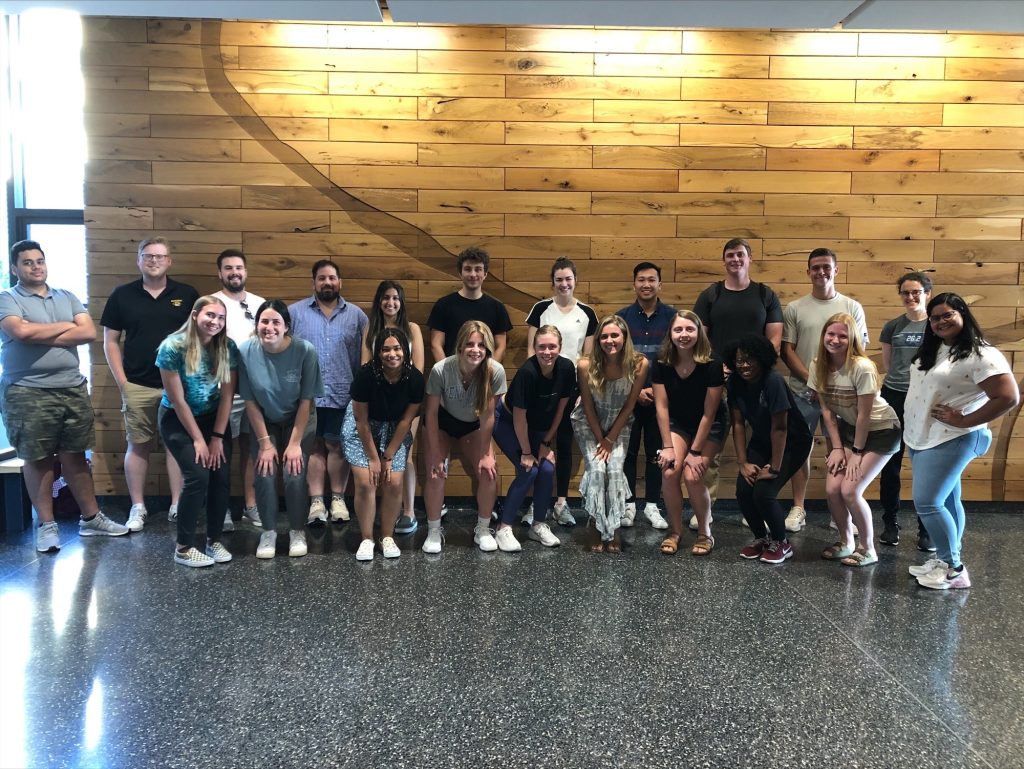
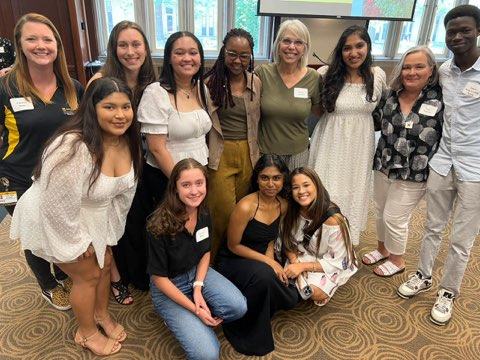
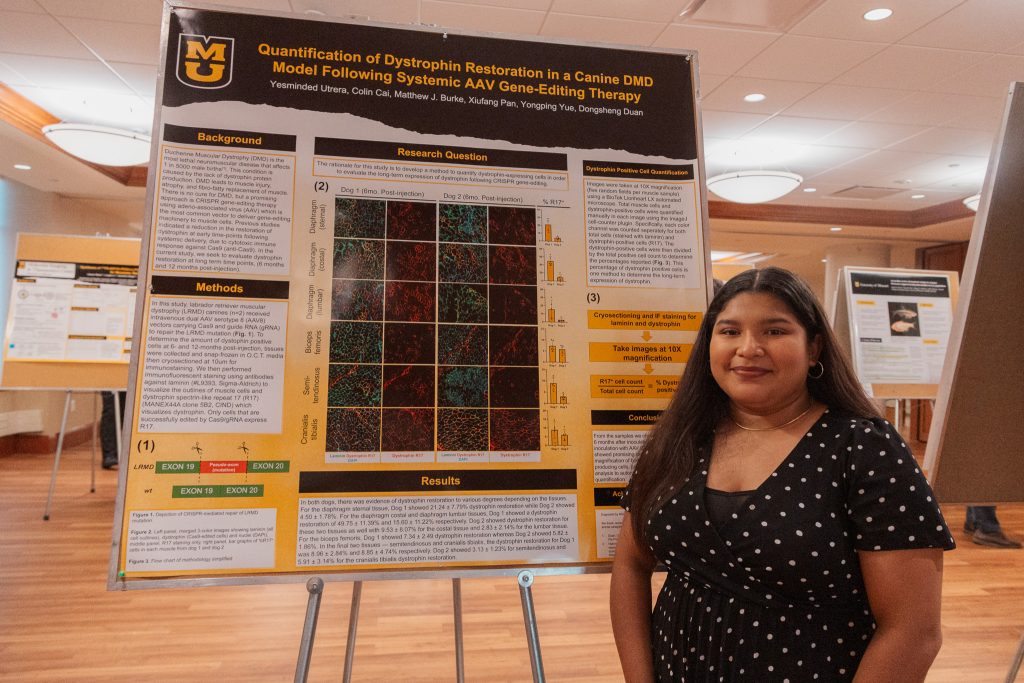
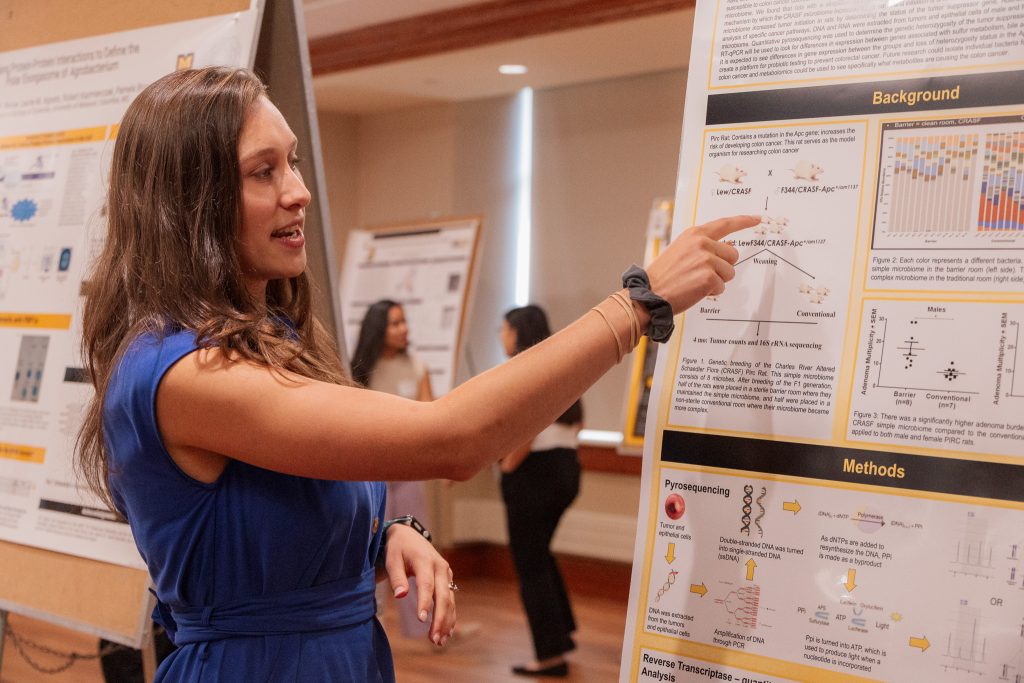

Application will close February 16th, 2025
To preview the application, click the PDF below.